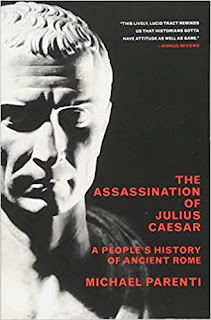Book Review: The Assassination of Julius Caesar: A People’s History of Ancient Rome

The Assassination of Julius Caesar: A People's History of Ancient Rome By Michael Parenti The New Press, 2003 276 pages History Review by Mark Polzin “How many ages hence/Shall this our lofty scene be acted o’er” remarks Cassius after the murder of Caesar in William Shakespeare’s Julius Caesar (III.i.112-113). When that scene has been acted on stage or written about by historians, Caesar is generally depicted as a tyrant, and his assassins as defenders of republican liberties. In The Assassination of Julius Caesar: A People’s History of Ancient Rome, author Michael Parenti strongly challenges that portrayal. Parenti argues that Caesar was assassinated not because he was a tyrant that abused his power, but because he was a reformer who looked out for the common people of Rome. The wealthy elites of the Roman Senate struck him down to avoid sharing their own wealth and power as a result of future reforms like those Caesar had already implemented. The depiction of Caesar as...



